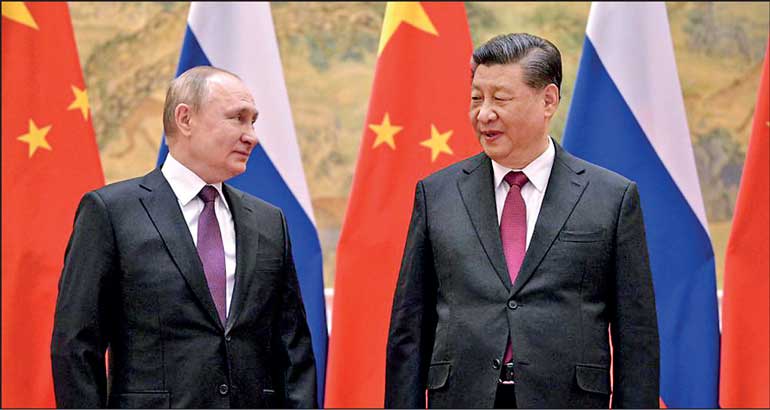Monday Feb 16, 2026
Monday Feb 16, 2026
Wednesday, 9 February 2022 00:00 - - {{hitsCtrl.values.hits}}

Russian President Vladimir Putin and Chinese President Xi Jinping
An event of considerable international geopolitical significance took place on 4 February 2022 in another part of the world, even as Sri Lanka celebrated its 74th year of independence. On that day, as the opening ceremony of the 24th Olympics Winter Games began in Beijing, President Vladimir Putin of the Russian Federation and President Xi Jinping of the People’s Republic of China issued a joint statement announcing a “new kind of relationship” between China and Russia, which pledged “mutually beneficial corporation” in an unprecedentedly wide-ranging area of activity with “no forbidden areas”, based on a friendship which they said “had no limits”.
the opening ceremony of the 24th Olympics Winter Games began in Beijing, President Vladimir Putin of the Russian Federation and President Xi Jinping of the People’s Republic of China issued a joint statement announcing a “new kind of relationship” between China and Russia, which pledged “mutually beneficial corporation” in an unprecedentedly wide-ranging area of activity with “no forbidden areas”, based on a friendship which they said “had no limits”.
This is especially significant given that both sides described this new relationship as being “superior to political and military alliances of the Cold War era”. They assured that the strengthening of the “strategic corporation” between the two countries was not “aimed against third countries”. This is obviously a reference to other alliances and coalitions of world powers that they see as arrayed against the rise of China, such as the Indo-Pacific Quad and the AUKUS (Australia, UK, US). Indeed, the Joint Statement makes special reference to the decision by the AUKUS to corporate in the field of nuclear submarines which they say contravenes their commitments on nuclear non-proliferation and poses a danger in the form of a nuclear arms race in the Asia-Pacific region.
The joint statement also refers to what they see as the negative impact of the Indo-Pacific strategy: “The sides stand against the formation of closed bloc structures and opposing camps in the Asia-Pacific region and remain highly vigilant about the negative impact of the United States’ Indo-Pacific strategy on peace and stability in the region.”
In an October 2019 interview for VZGLYED newspaper, one of Russia’s most distinguished foreign policy thinkers, Sergei Karaganov (a friend of Henry Kissinger and referred to internationally as ‘Russia’s Kissinger’) said that “Formalising the fact that Russia is the main provider of international security for the world and for itself should be one of the underlying ideas of Russia’s foreign policy”. He attributes it to the fact that Russia has “made it impossible for the West to regain its military superiority” due to its recent rebuilding of “strategic potential and effective deterrence capability”. With this, he says, “We have freed the world.” However, he recommends that this capacity is invested in the idea that Russia could be the “main stronghold of peace and strategic stability that will unite…the international community”. With regard to China, his interview clarifies the current convergence: “Their economic cushion makes us stronger, and our military power strengthens them.”
It is in this context that the joint statement says, “Russia and China have made consistent efforts to build an equitable, open and inclusive security system in the Asia-Pacific Region (APR) that is not directed against third countries and that promotes peace, stability and prosperity.”
Redistribution of global power
The joint statement positions the newly formed relationship in the context of the emerging world order which they say shows a “growing demand for the leadership aiming at peaceful and gradual development”. They describe the current moment of transformation as “multipolarity, economic globalisation, the advent of information society, cultural diversity, transformation of the global governance architecture and world order” and a trend towards “redistribution of power in the world”.
They call upon other states to seek “genuine multipolarity” and a “more democratic international relations” with the “United Nations and its Security Council playing a central and coordinating role”.
They articulate their joint position on the world order as “world powers and permanent members of the United Nations Security Council, intend to firmly adhere to moral principles and accept their responsibility, strongly advocate the international system with the central coordinating role of the United Nations in international affairs, defend the world order based on international law, including the purposes and principles of the Charter of the United Nations, advance multipolarity and promote the democratisation of international relations, together create an even more prospering, stable, and just world, jointly build international relations of a new type.”
In this effort Russia recognises the significance of the Chinese concept of a “community of common destiny for mankind”, and China acknowledges the “efforts taken by the Russian side to establish a just multipolar system of international relations.”
A new economic order: Ditching the dollar?
Last year, bilateral trade between the two countries had reached a “historic high” of $ 140 billion. During talks between the two heads of state, the official website of the President of Russia reports that they intend to increase bilateral trade to $ 250 billion. President Putin stated that he was “confident that we will certainly attain this level.”
In a significant development, President Putin “spoke about promoting the use of national currencies in mutual settlements, which the Chinese side supported.” In this way, the two countries have agreed to bypass the reliance on the US dollar for international trade.
During this visit to Beijing by President Putin, a 30-year contract to supply gas to China was signed which Reuters reported would be settled in Euros “in line with efforts by the two states to diversify away from US dollars”.
The report says quoting the Russian firm and a Beijing-based industry official that “Gazprom, which has a monopoly on Russian gas exports by pipeline, agreed to supply Chinese state energy major CNPC with 10 billion cubic metres of gas a year”.
Lanxin Xiang, professor of International History and Politics at the Graduate Institute of International and Development Studies Geneva, writing in Russia in Global Affairs in 2016 objected to the relationship between Russia and China being ‘often referred to as a marriage of convenience”, claiming that it was based on two “analytical frameworks: the conceptual framework of converging visions of the future world order and the…operational framework of harmonised national interest.”
He points out that the Chinese and Russian views of the world order was already “shared at this historical juncture” with both countries holding the view that Washington’s alienation from both Beijing and Moscow was rooted in the fear of losing its hegemonic status. He refers to Western observers using “allegories of animals to help interpret China” in their labelling of supporters of China as “Panda huggers” and those opposed as “Dragon Slayers”.
At the practical level, according to Xiang, the “harmonising” saw China’s investment in Russia grow by 80% in 2014 alone, coming close to $ 100 billion. The 4 February joint statement indicates further advances in the plans for the Eurasian Economic Union and the Belt and Road Initiative, reaffirming “their focus on building the Greater Eurasian Partnership in parallel and in coordination with the Belt and Road construction”.
Eurasian strategic cooperation
Already in 2016, China was one of the largest importers of Russian arms and were discussing joint arms research and development projects in 2016 (Xiang). The 2022 talks between the heads of state this month had also included bilateral military-technical cooperation among other things.
The annual Army Games in the Moscow region is an event that attracts teams from all over the world, including from Sri Lanka. In 2019, the vast space allocated to displaying the latest innovations also included a joint Chinese-Russian helicopter project.
Professor Karaganov in his 2018 interview praised Russia’s “seizing” of the intellectual leadership of “the sphere of strategic issues”, which is a departure from “the past” in which “we followed the USA’s…footsteps. Now we are beginning to take the initiative”.
The extremely well attended annual strategic security conference, The Moscow Conference of International Security (MCIS) is a reflection of this. Summarising the 2021 MCIS, Deputy Minister of Defence of the Russian Federation, Colonel General Alexander Fomin said: “Despite all limitations caused by the pandemic, this year the Conference was attended by about 700 delegates from 109 countries of the world and six international organisations, including 55 ministers and their deputies, chiefs of general staffs, as well as representatives of 94 foreign non-governmental organisations”.
India which attends every year is reported to have said it hopes to “intensify the cooperation and the strategic partnership with Russia in the future”.
Speaking at the 2019 MCIS by special invitation of Andrei Ilnitsky, advisor to the Russian Defence Minister Sergei Shoigu, on a panel that Ilnitsky moderated, the Sri Lankan Ambassador at the time Dr. Dayan Jayatilleka made the observation that on the Eurasian western edge, a military alliance had moved closer to the borders of Russia “going beyond the aims of the cold war to actually scrapping all notions of Yalta and Postdam” while “on the eastern flank of Eurasia, a maritime theatre…there is an unprecedentedly rapid buildup of possibly the most massive armada that we have known”, rather like an encirclement.
He posed the question that a historian might submit, considering the circumstances of the time: “What were the core States of Eurasia doing remaining at the…2019 level of cooperation, coordination consultation” rather than “taking a leap to a parallel integration” which would ensure a “global and ground strategic balance and equilibrium?”, concluding that such a lack of an “equivalent and balancing political military and ideological concept of competition and struggle” created “an asymmetry which poses a serious threat” to world peace. (MCIS 2019 Conference Proceedings, VIII Moscow Conference on International Security 23-25 April, Ministry of Defence of the Russian Federation, pp.71-72)
Two years later, the 2022 Russia-China convergence seems to answer that question. The day after the 4 February joint statement of the two heads of State of Russia and China, Chen Qingqing and Hu Yuwei writing in Defense Democracy Press say, “The two countries’ broad consensuses on almost all core issues related to global strategic stability, will further boost close strategic coordination that helps ensure global stability and peace”.
The report quotes Chinese experts describing the nearly 6,000-word joint statement, as “extremely rare”. They quote Lü Xiang, a research fellow at the Chinese Academy of Social Sciences, in the Global Times as observing that “It’s the first time that China and Russia released such a long statement after the meeting between the two heads of state, which includes all the major issues and strategic questions and shows that China-Russia ties have reached an unprecedented level”.
It also reports that President Xi has said he was “willing to work with President Putin to plan a blueprint for and guide the direction of China-Russia ties under new historical conditions.”
During the same visit, Foreign Minister Wang Yi and Russian Foreign Minister Sergei Lavrov met ahead of the leaders’ meeting. The Global Times reports on 4 February that they have “vowed to uphold peace and stability within the Asia Pacific region and opposing any attempt to create antagonism and confrontation among camps and groups.”
For Sri Lanka, located as it is, these developments are certainly not without consequence. It is imperative to take this new and unprecedented convergence and its lengthy articulation into account, including in its foreign policy calculus.